Quick links for drug and alcohol rehab in Glasgow
- Pre-rehab steps: Intervention for Drug and Alcohol Rehab in Glasgow
- Mental Health Issues & Drug and Alcohol Rehab in Glasgow
- How Can OK Rehab Help You Access a Drug and Alcohol Rehab in Glasgow?
- How Much Does Drug and Alcohol Rehab in Glasgow Cost?
- Is Drug and Alcohol Rehab in Glasgow Available on the NHS?
- How Long Does Drug and Alcohol Rehab in Glasgow Last?
- Inpatient or Outpatient Drug and Alcohol Rehab in Glasgow
- Alcohol Detox and Rehab in Glasgow
- Types of Therapy Offered at Drug and Alcohol Rehab in Glasgow
- The Importance of Dual Diagnosis During Drug and Alcohol Rehab in Glasgow
To truly understand how widespread of an issue addiction is, let’s look into the UK government’s report into adult substance misuse from 2020 to 2021.
It indicates that across that period, there were 275,896 adults in contact with drug and alcohol services.
The number of adults entering treatment in that same period was also 130,490. And that’s without even considering the number of people who haven’t yet reached out about their addiction problem.
Official statistics show more than 20% of Scotland’s drink hazardous levels of alcohol, with drug-related deaths also significantly on the rise in Glasgow and beyond.
| Drug and Alcohol-Related Deaths and the Need For Rehab in Glasgow (2020) | Value |
|---|---|
| Total Drug and Alcohol-Related Deaths | 1,339 |
| Yearly Increase (2019 to 2020) | 5% |
| Male vs Female Likelihood | 2.7 times more likely for males |
| Average Age of Deaths | 43 (increased from 32 over the last 20 years) |
| Age Range (2020) | 63% aged 35-54 |
| Deprivation Ratio (Most vs Least Deprived) | 18 times more likely (doubled in 20 years) |
| Health Board Areas (Largest Increase in Death Rate) | Greater Glasgow and Clyde: from 8.9 (2000-2004) to 30.8 (2016-2020) Tayside and Ayrshire and Arran: next biggest increases |
| Local Authority Areas (Highest Death Rate) | Dundee City: 43.1 (2016-2020) Glasgow City: 39.8 Inverclyde: 36.7 |
| Local Authority Areas (Largest Increase in Death Rate) | Dundee City: from 5.9 (2000-2004) to 43.1 (2016-2020) Inverclyde and Glasgow City: next biggest increases |
| Multi-Drug and Alcohol Presence in Deaths | 93% |
| Scotland’s Drug Death Rate vs UK and Europe | Over 3½ times that for the UK as a whole and higher than any European country |
The best way to recover from any addiction is some kind of drug and alcohol rehab in Glasgow.
This can take many forms, including private residential rehab.
Here, we’re going to look at a few of the options in a bit more detail.
Get alcohol and drug rehab in Glasgow for a number of addictions including binge drinking, alcohol addiction, benzodiazepine addiction, Buprenorphine addiction, cannabis use disorder, crack cocaine addiction, ketamine addiction, opioid use disorder, heroin addiction, cocaine dependence or cocaine addiction, any physical dependence or codependency, substance use disorder, and behavioural addictions such as gambling addiction and eating disorders.
Find help today from your ideal drug and alcohol rehab in Glasgow by giving us a call on 0800 326 5559
Pre-rehab steps: Intervention for Drug and Alcohol Rehab in Glasgow

Two people holding hands at a drug and alcohol rehab in Glasgow
As we’ve previously established, some form of rehab in Glasgow is nearly always the best option for addiction.
But no one suffering from addiction can truly heal unless they are motivated within themselves to do so.
Interventions can often be a good way to give them an outside perspective and make them see that they need help.
It might finally make them see the situation as it really is and how it’s affecting those around them.
In a traditional intervention, loved ones of the affected person will gather to read out letters detailing how the addiction has affected them and how they would like things to change moving forward.
There’s also the CRAFT approach, which stands for Community Reinforcement And Family Training.
Family members and/or other loved ones will learn how to positively reinforce and encourage the person as they recover.
In both of these, a professional interventionist is used – they can also be used alongside each other.
For guidance on how tot successfully guide a loved one towards drug and alcohol rehab in Glasgow, give our team a call on 0800 326 5559
How Do I Know If I’m Addicted?

Patients having a serious conversation at a drug and alcohol rehab clinic in Glasgow
We should highlight here that there’s a difference between use, abuse, and addiction.
While use simply means using drugs or alcohol in any capacity, abuse means using to a harmful extent.
This could mean that it’s harmful to various aspects of your own life or to others.
While abuse doesn’t always lead to addiction, abuse will be the starting point if addiction does occur.
Addiction is a disorder where you can’t stop yourself from using, in spite of all the aforementioned harm.
There are many criteria used by professionals to determine whether or not someone has an addiction.
One of the most common is the CAGE questionnaire, which uses four simple questions:
- Have you ever felt like you should Cut down on your drinking?
- Have people Annoyed you by criticising your drinking?
- Have you ever felt bad or Guilty about your drinking?
- Have you ever had an Eye-opener to get yourself going in the morning?
The use of each letter in CAGE makes it easy for practitioners to remember, and it has the added benefit of not being too drawn out.
The 5th edition of the Diagnostic and Statistical Manual for Mental Disorders, also known as the DSM5, also has diagnostic criteria for substance dependence.
It’s seven most significant points are:
- Hazardous use
- Social or interpersonal problems relating to the use
- Neglected major roles to use
- Withdrawal
- Tolerance
- Using larger amounts for longer
- Repeated attempts to control the use or quit
Nor sure if you need the help of a drug and alcohol rehab in Glasgow? Talk it over with our expert team on 0800 326 5559
How Can OK Rehab Help You Access a Drug and Alcohol Rehab in Glasgow?
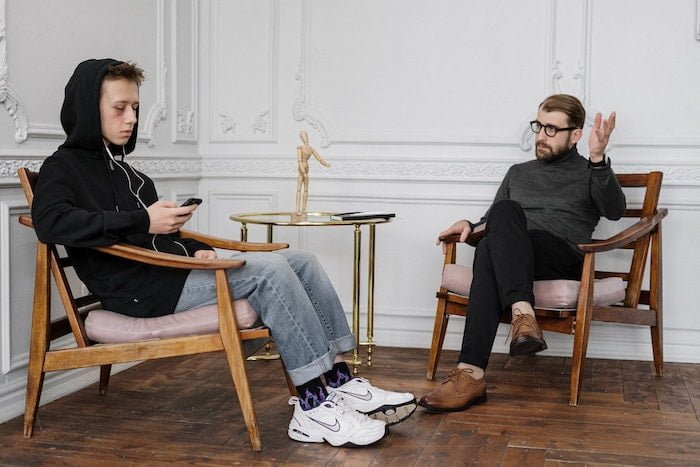
Young person sat in therapy at a drug and alcohol rehab centre in Glasgow
If you live in Glasgow and you have a complicated relationship with drugs or alcohol, you are not alone.
Unfortunately, substance abuse is a huge problem in this city, with three people a day dying from drug-related problems. Consequently, the NHS waiting lists for drug and alcohol rehab in Glasgow are extremely long.
That’s where OK Rehab comes in. We provide speedy referrals for treatment in a residential rehab centre or outpatient clinic. Alternatively, we can help you arrange an at-home detox.
Simply give us a call on 0800 326 5559, and we will immediately begin organising treatment for you or your loved one.
Generally, this treatment will consist of a detoxification process and many therapy sessions.
Types of therapy at a private drug and alcohol rehab include Acceptance and Commitment Therapy, acupuncture, art therapy, cognitive behavioural therapy, dialectical behaviour therapy, drama therapy, Eye Movement Desensitization and Reprocessing, group psychotherapy, motivational therapy, Rational Emotive Behavior Therapy, brief intervention, contingency management, coping mechanisms work therapy, equine therapy, family therapy, group therapy, individual therapy, mindfulness, motivational interviewing, music therapy, and talking therapies.
Whether you feel comfortable with a Glasgow-based rehab or one that is further afield, we can help you find the ideal place for you.
Please call our 24-Hour Helpline: 0800 326 5559
How Much Does Drug and Alcohol Rehab in Glasgow Cost?

Pile of money
The cost of drug and alcohol rehab in Glasgow or anywhere else largely depends on several factors.
The kind of treatment you go through is a big one, as well as the kind of room you go for in residential treatment and/or the organisation you choose to recover with.
Some luxury rehab centres in Glasgow and beyond can cost as much as £74,000 for a thirty-day stay – but the average cost for a 28-day stay is about £10,000.
It’s very important to research every organisation you’re considering to check that it’s affordable to you.
Make sure that you end up at your ideal drug and alcohol rehab in Glasgow by giving us a call on 0800 326 5559
Is Drug and Alcohol Rehab in Glasgow Covered by Health Insurance?

Woman looking out at the countryside at a drug and alcohol rehab centre near Glasgow
The simple answer to this is yes, but there are some complications.
Rehab costs might be covered as part of your employee health insurance – but you will need to disclose to your employer that you have addiction issues, which may not be comfortable for everyone.
On a similar note, you can make it part of an overall insurance plan – but again, this needs to be added and will mean you have to talk about your addiction.
Again, we would advise you to research this thoroughly before diving into anything, taking your specific situation into account.
Whatever your financial situation, allow our expert team to guide you towards a suitable drug and alcohol rehab in Glasgow by calling us on 0800 326 5559
Is Drug and Alcohol Rehab in Glasgow Available on the NHS?

Couple talking to a therapist at a drug and alcohol rehab in Glasgow
Funding for drug and alcohol rehab in Glasgow is available on the NHS – but unfortunately, it’s notoriously difficult to access.
The funding is ring-fenced and is administered by local councils, not the NHS.
To get it, you won’t just be able to go it alone – you’ll need help and support from an outside statutory body like Change Grow Live.
You’ll also have to essentially prove that you deserve the funding, which can be emotionally draining for a lot of people, especially considering how different addiction already is.
It’s a difficult journey, which might be worth it or might leave you exhausted and disappointed.
Other free organisations offer drug and alcohol rehab support in Glasgow
Below is a list of other organisations that give free support for drug and alcohol addiction around Glasgow:
1. Scottish Families Affected By Alcohol & Drugs
Address: 199 Sauchiehall St, Glasgow G2 3EX
Telephone: 0808 010 1011
Website: http://www.sfad.org.uk/
2. Turning Point | Glasgow Alcohol and Drug Crisis Service
Address: 80 Tradeston St, Glasgow G5 8BG
Telephone: 01414 206 969
3. North CAMHS
Address: Barr St, Glasgow G20 7LR
Telephone: 0141 277 7175
Website: https://www.nhsggc.scot/hospitals-services/services-a-to-z/specialist-childrens-services-2/
You can also call a number of helplines, including Mind UK, YoungMinds, Rethink Mental Illness, Samaritans and Papyrus, SMART Recovery or find an Alcoholics Anonymous, Narcotics Anonymous or Cocaine Anonymous that’s near you. These groups help you find a higher power to give yourself over to. The NHS are also there to give you support.
Other organisations that give you help for free include a local NHS Foundation Trust, Turning Point, We Are With You, National Association for Children of Alcoholics, Change Grow Live, Al-Anon and Alateen.
Rehabs and organisations are advised by the American Society of Addiction Medicine and the National Institute for Health and Care Excellence so you are in safe hands with person-centered care.
You may also be offered sober living houses as part of your aftercare after you leave rehab in order to help you maintain your sobriety and help with relapse prevention.
Get help accessing drug and alcohol rehab in Glasgow by calling us today on 0800 326 5559
How Long Does Drug and Alcohol Rehab in Glasgow Last?

Couple walking through a field during outdoor therapy at a drug and alcohol rehab clinic in Glasgow
Drug and alcohol rehab in Glasgow generally has three stages: rehabilitation, detoxification, and aftercare.
The length of each stage will depend largely on how much treatment you need and how well the last stage went.
We recommend an absolute minimum of seven days at a rehab in Glasgow for alcohol detox.
But the best time frame really looks more like 28 days, as this really gives you time to focus on both your mental and physical recovery, making full use of therapy and counselling.
This thinking also applies to other addictions – the longer you spend on the mental parts of recovery, especially, the more effective it will be.
Please call our 24-Hour Helpline: 0800 326 5559
NHS vs Private Drug and Alcohlo Rehab in Glasgow
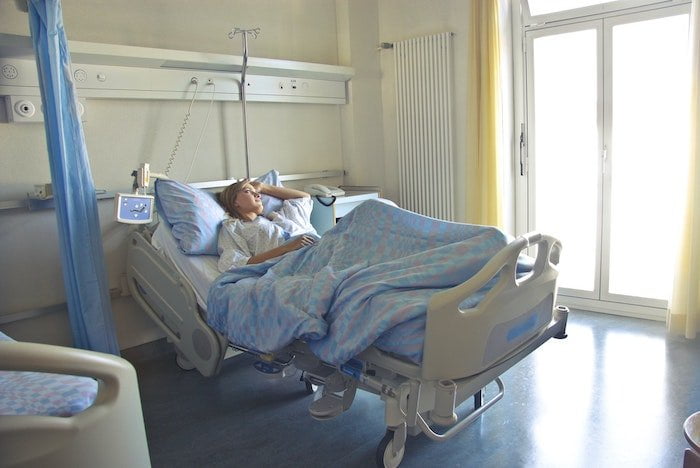
Person lying in a bed at a drug and alcohol rehab centre in Glasgow
Both NHS and private addiction treatment have benefits – once again, it’s simply a case of deciding what works best for you.
In comparison to private residential treatment, NHS treatment is much more likely to be based in your local area.
This is obviously more comfortable and more convenient for a lot of people.
And while private addiction treatment in Glasgow can get expensive, the NHS is free and available to all, making it more accessible.
But there can also be long waiting lists, with the treatment once you get there being a lot less personalised.
A high level of personalisation is important in addiction treatment, as every case is so unique, with its own factors that are preventing you from recovering.
Find your way towards recovery with the help of a drug and alcohol rehab in Glasgow – call our team for free on 0800 326 5559
Inpatient or Outpatient Drug and Alcohol Rehab in Glasgow
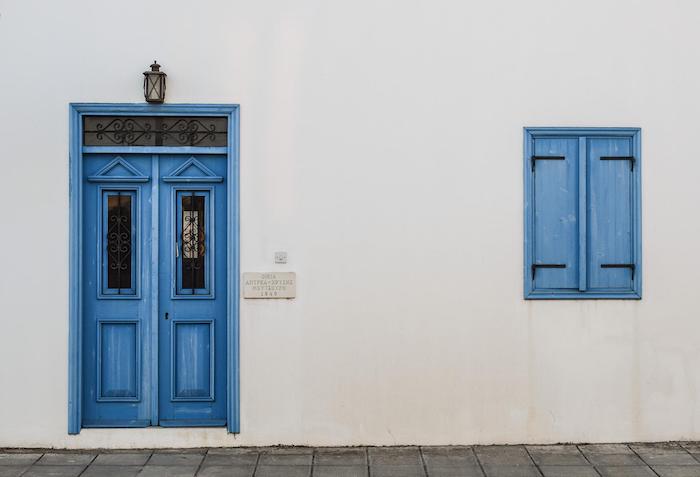
Blue door and window at a drug and alcohol rehab centre in Glasgow
When we put addiction treatments into categories, primarily to decide which would work best for each person, one of the biggest distinctions is between inpatient and outpatient treatment.
Inpatient treatment is probably what you’d stereotypically think of if you try and picture rehab.
It’s the kind that involves treatment at a residential centre – the other option is outpatient treatment, where you stay at home.
For many people, that’s both more comfortable and more convenient. But it’s also less intensive, meaning it’s less likely to work for more severe cases.
Inpatient treatment puts you in a space where you’re essentially surrounded by treatment – with outpatient treatment, you’ll need to be able to manage your own recovery to some extent, which isn’t always easy.
If you’re in a toxic environment that’s currently driving your addiction, residential treatment in Glasgow or further afield could also give you a chance to get away.
Even if that’s not the case for you, having a chance to reset by taking some time away could still be a good thing, especially if your addiction has really damaged your relationships or caused you to hurt people you love.
Please call our 24-Hour Helpline: 0800 326 5559
Alcohol Detox and Rehab in Glasgow
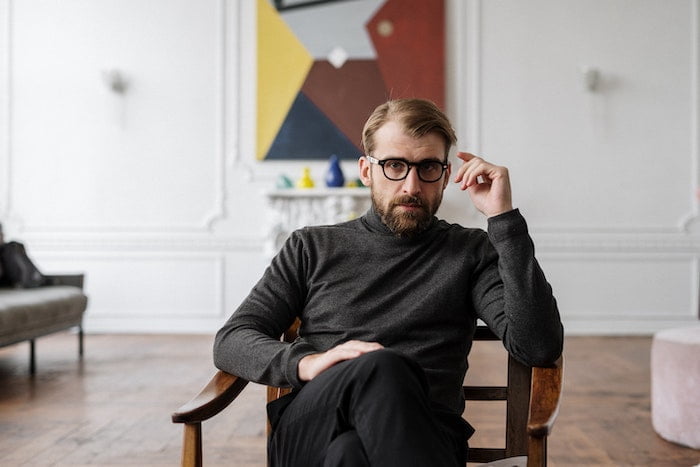
Person taking medication at a drug and alcohol rehab centre in Glasgow
Alcohol addiction is unfortunately common, with a study by Robin Room, Thomas Babor and Jürgen Rehm revealing that ‘4% of the global burden of disease is attributable to alcohol’, accounting for almost as much death and disability as tobacco and high blood pressure (hypertension) globally.
Like other physical addictions, alcohol may cause withdrawal symptoms if you’ve developed a dependency and suddenly drop your intake.
This is because your body has reached a stage where it’s become reliant on alcohol.
The symptoms you experience may also depend on how severe your addiction is and what stage of withdrawal you’re at.
In an unsupported detox, six hours after your last drink, you may experience:
- Shaky hands
- Anxiety
- Insomnia/a disrupted sleep pattern
- Headaches
- Nausea
- Vomiting
These are some of the most common alcohol withdrawal symptoms.
If you have a more severe addiction and aren’t receiving the correct support to withdraw safely, 12 to 48 hours after your last drink, you may experience:
- Hallucinations
- Seizures
And in the worst cases, 48 to 72 hours after your last drink, you may experience:
- An elevated heart rate
- Confusion
- Sweating
- High blood pressure
- Fever
To help you avoid the most dangerous of these symptoms, for alcohol, we’d recommend a pharmacological intervention, more specifically a Librium-based detox (Chlordiazepoxide), over a ten-day period to reduce the risk of withdrawal seizures.
Following on from this, we also recommend a further three weeks of drug and alcohol rehab in Glasgow to truly root out the emotional causes of your addiction.
Other types of medication you might need to help with your recovery include Acamprosate (Campral®) which helps rebalance the chemicals in the brain that have been damaged by alcohol; an antidepressant like nefazodone, desipramine, or imipramine to aid any anxiety or depression caused by alcohol; or the opioid antagonist Naltrexone which works to uncouple the relationship between alcohol and pleasure.
Finally, as we move on to the aftercare stage, we’ll work with you to prevent relapse through a solid relapse prevention plan.
One of the most important parts of this is trigger identification.
We’ll teach you to identify any potential triggers that could lead to relapse, so you’ll be able to avoid and/or cope with them moving forward.
A relapse prevention plan will also include details of exactly what should happen if you do relapse and any lifestyle changes you might need to make.
Please call our 24-Hour Helpline: 0800 326 5559
Rehab for Cocaine in Glasgow
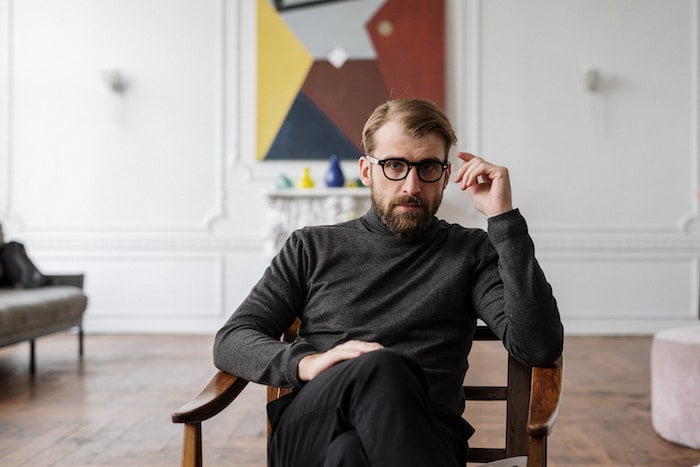
Therapist looking into a camera at a drug and alcohol rehab clinic in Glasgow
As cocaine isn’t physically addictive, the withdrawal symptoms it produces are mostly psychological.
They include:
- Depression
- Fatigue
- Increase appetite
- Agitation
As these are far less dangerous than the withdrawal symptoms you might experience with alcohol or opiates, this means that cocaine doesn’t require a detox at the start of treatment.
Instead, there’ll be a stronger focus on your mental recovery through therapy and counselling.
Cocaine is one of the most addictive drugs out there, as it’s known to produce a euphoric high followed by a crash.
This encourages repeat usage – tolerance to cocaine also builds up fast.
If you need more information on cocaine addiction specifically, we have more information here.
Please call our 24-Hour Helpline: 0800 326 5559
Drug and Alcohol Rehab in Glasgow for Heroin

Patient on a sofa talking to a therapist at a drug and alcohol rehab in Glasgow
Heroin is one of the most physically addictive drugs around.
It’s an opiate, which means that it binds to opioid receptors in your brain– this then impacts the brain’s pleasure centres, affecting your mind and body if you have a dependency and your intake suddenly drops.
In an unsupported detox for heroin,withdrawal symptoms will start six to twelve hours after your last dose.
They’ll then peak at one to three days and will start to subside after a week. But in severe cases, symptoms can last for several more weeks, months or even years.
Withdrawal symptoms can include:
- Sweating
- Shaking
- Muscle spasms
- Depression
- Vomiting
- Diarrhoea
- Insomnia/a disrupted sleep pattern
- Impaired respiration, hypertension and an increased heart rate in severe cases.
As a result of this, a full physical detox will be required at the start of heroin addiction treatment.
We’ll need to make sure you get it out of your system in a safe manner with the right medication to avoid the worst withdrawal symptoms.
Then, like all other treatment plans, we can move on to healing your mental health with therapy and counselling.
You will also receive treatment for any other effects of heroin, such as hepatitis.
If you need more information on heroin addiction, it’s available on our website here.
Please call our 24-Hour Helpline: 0800 326 5559
Drug and Alcohol Rehab in Glasgow for Cannabis
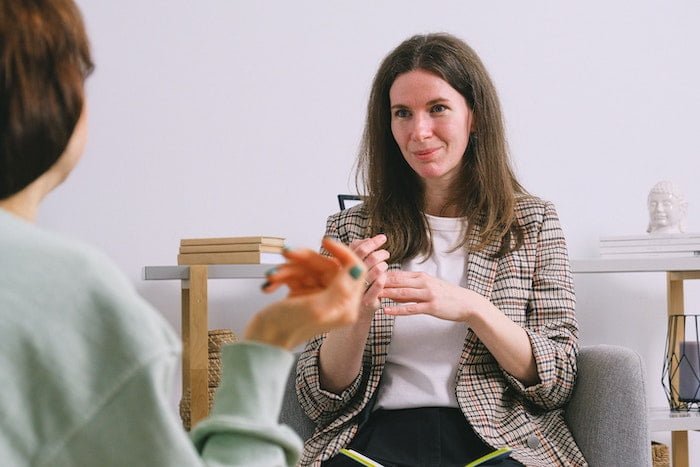
Therapist listening to a patient at a drug and alcohol rehab in Glasgow
As cannabis is more socially accepted and isn’t physically addictive, a lot of people assume that makes it less dangerous.
But a cannabis addiction can still ruin someone’s life and requires treatment.
Withdrawal symptoms of cannabis include:
- Mood changes
- Irritability
- Headaches
- Loss of focus
- Sweating
- Chills
As withdrawal symptoms for cannabis are less severe, in treatment for cannabis addiction, the focus will mainly be on therapy and counselling.
More information on cannabis rehab in Glasgow is available from our website here.
Please call our 24-Hour Helpline: 0800 326 5559
Types of Therapy Offered at Drug and Alcohol Rehab in Glasgow
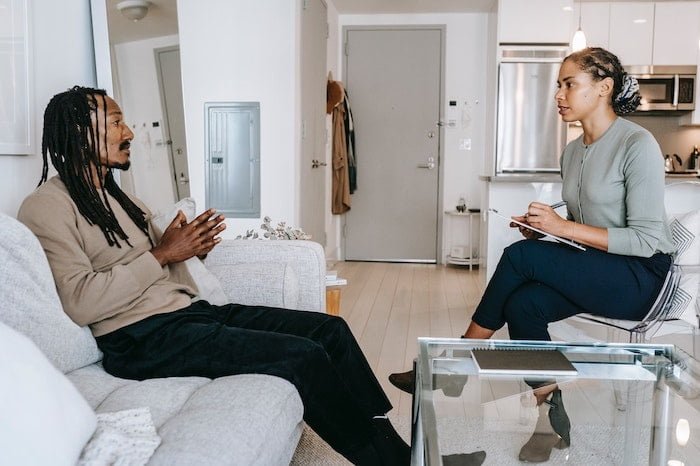
Patient and therapist talking in the living area of a residential drug and alcohol rehab in Glasgow
As addiction is so strongly connected to mental health, addiction treatment in Glasgow has a strong focus on healing through therapy and counselling.
Kinds of therapy on offer through drug and alcohol rehab in Glasgow include:
- Cognitive Behavioural Therapy (CBT) – In cognitive behavioural therapy, the focus is on rooting out cognitive distortions. These toxic thinking and behaviour patterns can often cause you to spiral, hindering progress in addiction recovery especially.
- Dialectical Behavioural Therapy (DBT) – uses the same model as CBT, but it specifically teaches you how to manage negative emotions. This is especially important as negative emotions can often lead to the spirals mentioned above, which can then trigger a relapse.
- Brief interventions – Brief interventions are essentially check-ins with the professionals managing your recovery. It’s important that everyone involved keeps track of your progress to make sure you’re doing ok and are still on the road to recovery.
- Motivational Interviewing (MI) – uses a series of non-judgmental questions to encourage you to change. For practitioners, the five principles of motivational interviewing are developing discrepancy, expressing empathy, avoiding arguments and confrontations, adjusting to client resistance and supporting a client’s self-efficacy and optimism.
- Holistic Therapies – The term “holistic” comes from the Greek term “Holos”, meaning whole – in accordance with this, holistic therapy focuses on healing the whole self, often with activities. Examples include art therapy, music therapy, adventure therapy and equine therapy.
- Group Therapy – In group therapy, one therapist will work with a group of people. This can be highly beneficial in keeping everyone on track and motivated, and it can help a lot of people to feel less alone too.
- Individual Therapy – On the other hand, you might feel more comfortable working through your addiction in a private space. This is where individual therapy can be beneficial. It also allows your therapist to focus on you specifically, which can be an important level of personalisation for a lot of people.
- Family Therapy– Addiction doesn’t just hurt the person suffering from it. If your family has been affected by addiction, then family therapy could be a consideration.
- AI-Anon family group meetings could also be a good choice in that situation.
Another form of therapy is Co-dependency treatment – Co-dependency is an unhealthy relationship dynamic where one person’s needs are continually prioritised over another’s. Some classic characteristics of co-dependent people are:
- Chronic anger
- Problems with intimacy and/or boundaries
- Fear of abandonment
- Extreme need for approval and recognition
- An exaggerated sense of responsibility for the actions of others
This can often arise from addiction – luckily, specific treatment for it is available!
If what we’ve listed here feels all too familiar, co-dependency treatment could be a good option.
Twelve-Step Facilitation Therapy (TSF) – As its name would suggest, twelve-step facilitation therapy uses the twelve steps of alcoholics anonymous to help guide your recovery.
Please call our 24-Hour Helpline:0800 326 5559
The Importance of Dual Diagnosis During Drug and Alcohol Rehab in Glasgow
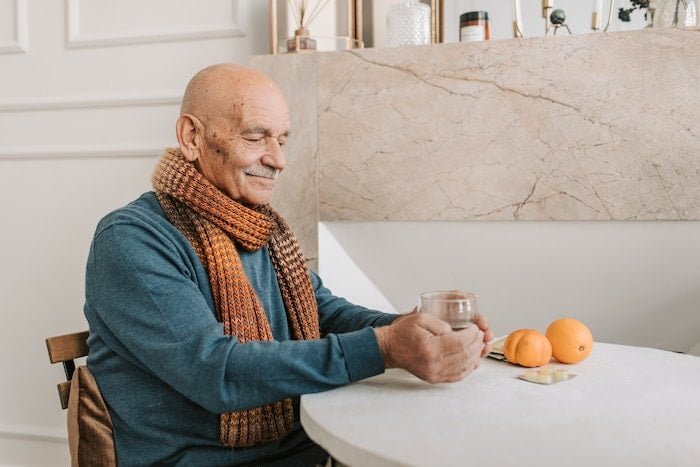
Older man sat at a drug and alcohol rehab in Glasgow
A majority of people coming into drug and alcohol rehab in Glasgow have multiple mental health issues such as depression, post traumatic stress disorder (PTSD), bipolar disorder, borderline personality disorder, obsessive compulsive disorder (OCD) or schizophrenia and anxiety, which all need to be taken into consideration for you to fully heal.
Some of the biggest examples are anxiety, bipolar disorder, schizophrenia and depression – all of these will change your relationship to addiction and the way you respond to it.
Treatment in Glasgow will vary based on your background, so it’s very important that you’re open and honest about any issues you might have.
Full knowledge of your background will be needed for us to treat you effectively.
When you enter rehab you will get a psychiatric assessment by a psychiatrist who will see if you need psychiatric treatment.
Please call our 24-Hour Helpline: 0800 326 5559
How Drug and Alcohol Rehabs in Glasgow Help With Relapse Prevention
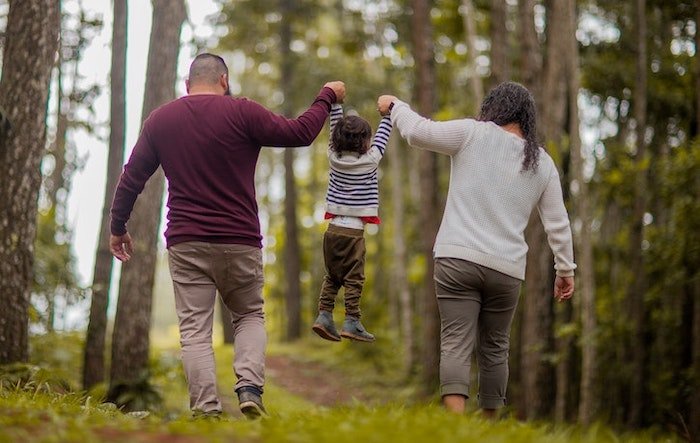
Couple carrying a child through the woods during outdoor therapy at a drug and alcohol rehab centre in Glasgow
Once you’re past the initial stages of treatment at a drug and alcohol rehab in Glasgow, the main goal will be preventing relapse.
One of the ways we’ll try to help you with this is through a solid relapse prevention plan.
This plan needs several key aspects, including:
- Lifestyle changes – When you come out of treatment, you might need to make lifestyle changes to help you continue to make progress. This could mean changing your job, moving to a new location or ending toxic relationships – it really does just depend on your specific circumstances.
- A plan for if you do relapse – This should include a step-by-step guide as to what should happen, as well as people and places to contact. Having this included means that if the worst does happen, potential damage might be limited.
- Triggers and cravings – It’s also vital that we identify any potential triggers and teach you how to cope with them. At the same time, we’ll also teach you to detect cravings at the earliest possible stage whilst also giving you strategies to try and make sure that they don’t lead to relapse.
Please call our 24-Hour Helpline: 0800 326 5559
Aftercare and Support Services Once Drug and Alcohol Rehab in Glasgow is Completed
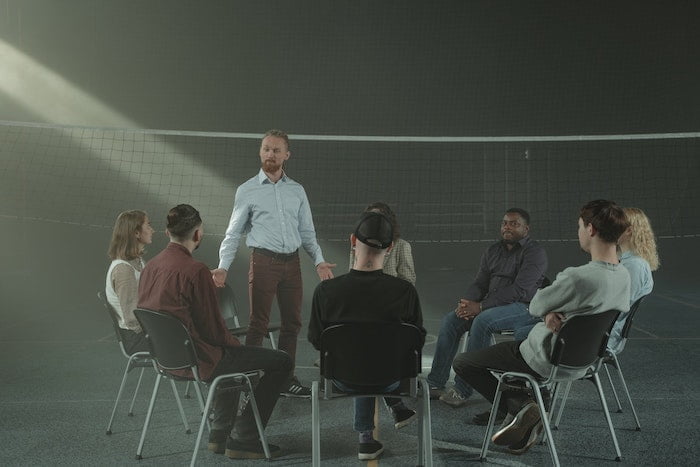
Support group meeting together at a drug and alcohol rehab in Glasgow
Drug and alcohol rehab in Glasgow generally happens in three stages: detoxification, rehabilitation, and aftercare.
Detoxification is the process of getting drugs or alcohol out of your system before you start treatment in a safe way.
Rehabilitation is the process of healing after that, and aftercare intends to help you transition into your new drug and alcohol-free life.
Several support services will be available to you at this stage:
- Alcoholics Anonymous (AA) and Narcotics Anonymous (NA): Support groups like alcoholics anonymous and narcotics anonymous are a staple of treatment for good reason. These groups aid so many people’s continued recovery as they give addiction sufferers a safe and place to talk about their issues. They’ll also allow you to form bonds with people who can truly understand what you’ve been through.
- Al-Anon Family Group meetings: On a similar note, AI-Anon family group meetings also serve a similar purpose, but with a focus on the families of those suffering from addiction.
- SMART Recovery: SMART stands for self-management and recovery training. Overall, it encourages you to manage your own recovery by controlling your own cravings. This works well for preventing relapse, especially at later stages when you’ll be more ready to stand on your own.
- Home detox: While detoxes do need to be in a residential space in more severe cases, an at-home detox in Glasgow might be an option if you’re at an earlier stage of addiction. We should note that this is different to an unsupported detox, where you try and stop drinking or taking drugs without any professional help. This is likely to be ineffective and could even be dangerous in some circumstances. In an at-home detox, you’ll still have a full team helping to guide your recovery, supporting you all the way through.
- Outpatient treatment via a local Drug & Alcohol team in Glasgow: This will also be the case in outpatient treatment via a local drug and alcohol team in Glasgow. You’ll be able to recover at home, in an environment you feel comfortable. In aftercare specifically, through outpatient treatment, we’ll help to support you in whatever way we can.
Please call our 24-Hour Helpline: 0800 326 5559
Life After Drug and Alcohol Rehab in Glasgow
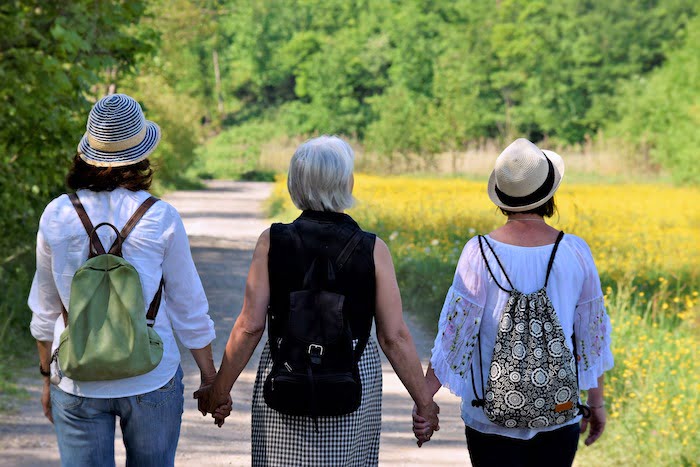
Three patients walking together through a field during outdoor therapy at a drug and alcohol rehab clinic in Glasgow
The idea of moving from your new safe space, where you are closely monitored, to a world full of temptation can be extremely daunting.
Rehab centres in Glasgow are aware of this, and so they offer as much help as possible to keep you on the right path following your rehab journey.
You will receive a relapse prevention plan that is designed to help you stay sober for the 12 months following rehab (the time in which you are statistically most likely to relapse).
This plan consists of group therapy, individual therapy, access to the helpline of the rehab and more. Usually, you will continue with therapy sessions in the same centre in Glasgow that you stayed in for in-patient rehabilitation.
This will include therapies such as CBT, motivational interviewing, and the 12-step work that is seen in Alcoholics Anonymous.
It is also important to remember that you will be in a much better place to handle temptation after a stay at a drug and alcohol rehab in Glasgow.
You will possess a host of skills learnt in therapy that you can employ when necessary, such as distraction techniques and talking with a therapist or a trusted friend.
Please call our 24-Hour Helpline: 0800 326 5559
Frequently Asked Questions About Drug and Alcohol Rehab in Glasgow

Patient speaking with a therapist at a drug and alcohol rehab centre in Glasgow
1. Do I Have an Addiction?
Many people wait until they have lost everything before they admit they need help with alcohol or drugs.
However, the damage starts much earlier than that, and therefore treatment should start earlier.
Key behavioural signs of addiction include the regular use of substances, concern expressed by family and friends, personality changes, and the act of hiding one’s consumption from others.
Mentally, you may feel paranoid and experience frequent low moods. Pre-existing mental illnesses can worsen, and new ones can arise. Finally, some physical signs are fatigue and insomnia.
If you identify with some of these symptoms, call us today, and we will arrange help for you.
On the other hand, perhaps you are concerned about a family member or friend. In that case, please do contact us for advice. Even if your loved one does not consent to attend rehab, we can suggest ways in which you can help them with their addiction.
The most successful technique is to practise unconditional love and support while clearly expressing your concern for their wellbeing.
2. Can I Delay Treatment in Glasgow?
Wanting to delay treatment is natural. We may believe we don’t have the strength to live a sober life, or we may be secretly hoping our addiction goes away on its own.
These beliefs keep us trapped in the vicious cycle of addiction.
No matter how long you have been addicted to drugs or alcohol, and no matter how severe the addiction is, you are certainly capable of overcoming it.
Perhaps you believe there are valid reasons to delay treatment, such as serious work commitments. The truth is, nothing is more important than recovery.
Without professional help, your symptoms will only get worse, and this could result in you losing everything, including your job.
We are here to make sure that doesn’t happen.
3. Will I Be Judged For Asking For Help?
While we cannot control how others view you as a result of you asking for help, we can promise that there will be zero judgement on behalf of OK Rehab.
Our staff have all dealt with substance abuse problems, meaning we completely understand your struggles.
During our phone call, we will do everything we can to make you feel comfortable and heard.
If you would rather have a staff member contact you directly, you can fill out the ‘Request a Call’ form on our website, and we will be happy to contact you as soon as possible for a friendly discussion.
Please call our 24-Hour Helpline: 0800 326 5559
Contact Us
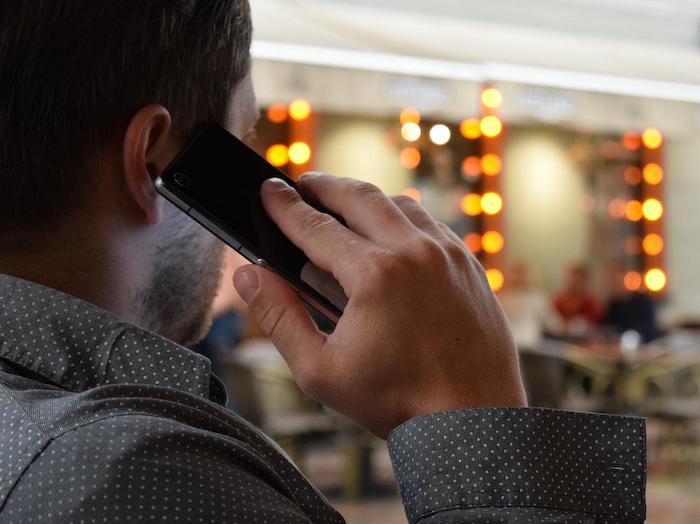
Man talking on a phone at a drug and alcohol rehab in Glasgow
We strongly encourage you to contact us for a free assessment if you or a loved one has become dependent on substances.
In a matter of days, you could be in touch with addiction specialists at a premium drug and alcohol rehab centre in Glasgow. All of the drug and alcohol rehabs need to be registered and audited by the Care Quality Commission (CQC).
From there, you will have access to excellent resources that will help you seek long-term recovery. With detox, therapy, and other forms of rehabilitation, we believe you have every chance of recovering from the horrible disease of addiction.
If recovery sounds beneficial to you, do not hesitate to call us on 0800 326 5559 or request a call from one of our staff members here on the OK Rehab website.
We have helped clients from a wide range of backgrounds; no situation is too complicated for us to treat.
Health is not something you can delay, so act fast to fight your addiction.
OK Rehab also provides addiction support across the UK, including Aberdeen, Dundee, Edinburgh, Inverness, Perth, Paisley, Hamilton, Livingston and Stirling and the rest of Scotland.
Please call our 24-Hour Helpline: 0800 326 5559





